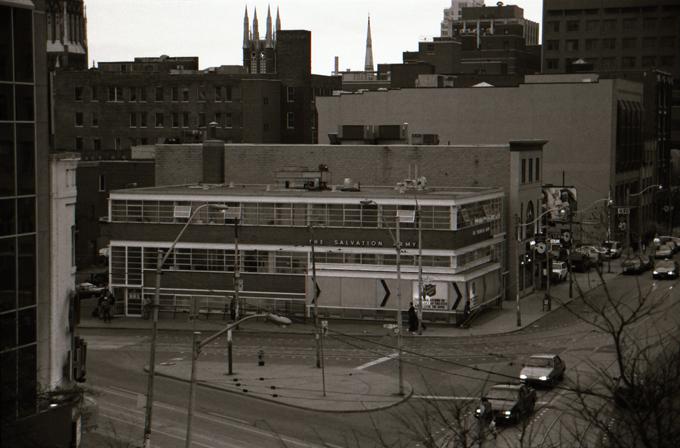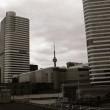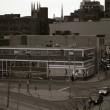- As the expropriation deadline nears for the Yonge-Dundas redevelopment, the store lights have gone out and signs have gone up announcing closures. PHOTO: EYE FILES
- As the expropriation deadline nears for the Yonge-Dundas redevelopment, the store lights have gone out and signs have gone up announcing closures. PHOTO: EYE FILES
Ryerson grads design public square
By Graeme Smith
When a group of architecture students at Ryerson spent late nights doing school assignments together, they couldn’t have guessed they would someday design the biggest project in the neighbourhood.
But that’s exactly what Joe Frasca, Richard Park, Carlo Parente and Daniel Herljevic have achieved.
The four architects met at Ryerson and founded studioblackbox in 1959 after graduating. On Dec. 1, Mayor Mel Lastman announced their project team won the design competition for Dundas Square.
The city is planning to spend $2.15 million to build a public square at underground parking garage between Yonge and Victoria Streets, south of Dundas, as part of a $90 million revitalization of the area. The square is scheduled to open fall 2000.
The Ryerson grads teamed with architects James Brown and Kim Storey to create the winning submission. Studioblackbox’s contribution to the project included design and computer modeling.
The plan is to cover the square with patterned granite blocks, sloping up from Victoria and Yonge Streets to the middle, which will be raised about one metre above sidewalk level. The square will have an aperture with access to the subway, PATH and an underground parking garage, as well as a long canopy, small fountains, a stage, natural landscaping and projecting screens for advertisement lighting.
How the numbers break down
In this $90 million public-private project, the city will expropriate properties along the corners of Yonge and Dundas Streets by this Friday. The city will sell some of the land to PenEquity Management Corp., a private developer.
On parcel A., the site of Ryerson’s parking garage and stores such as Harvey’s and the pinball arcade, PenEquity will build a theatre and retail complex called Metropolis by fall 2000.
The city is developing parcel D itself, building a $2.5 million public square and underground parking garage.
The city is still in negotiations to develop parcels B and C.
Offers of compensation to the landowners were presented by Oct. 15, 1998. The city will spend approximately $35 million to compensate the 10 property owners whose lands will be expropriated. Only two have settled.
The first to take the city’s offer of compensation were the property owners of 299 Yonge St., which houses World of Shoes. Colekin Investments Ltd. was paid $2,425,000, an estimated $37,200 for Land Transfer Tax, plus incidental expenses.
PenEquity will pay the city up to $37 million for purchasing parcel A and for profit participation and right-of-ways payments for O’Keefe Lane and parts of Victoria and Gould Streets.
The agreement between the city and PenEquity states that the developers will reimburse the city up to $3 million if the costs of acquiring the land go over the projected allocated cost. PenEquity is capped at paying the city $37 million.
Gross costs to the city for land assembly, building the public square and other fees: $53 million. Net costs: $14.4 million.
The city pegs some of the expected benefits from the projects at: $5 million to $10 million over 20 years for a potential net benefiting levy charged to local business: $5 million to $10 million over 20 years for a potential net benefiting levy charged to local business; $5 million for the potential sale of naming rights and sponsorship deals; $15.1 million for the increase in property tax revenue resulting from the project; and $24.9 million for the increase in property tax revenue from spin-off redevelopment.
Ryerson expects to benefit by $17.1 million over 20 years, some of which is from guaranteed higher parking revenues and the payment of $1 million for the sale of the air rights above the parking garage.
Development will cause traffic chaos
What the Yonge-Dundas redevelopment will mean to Ryerson students over the next two years can be summed up in one word — chaos.
With construction beginning by the spring on the north and south sides of Dundas Street, students can expect battles trying to get to and from class until it’s wrapped up by fall 2000.
“it will be kind of messy, absolutely, we realize that,” said Gary Wright, of the city’s urban planning and development services.
The properties that have been expropriated for the project are already mostly vacant. By Monday, Wright said developers will start to build wooden hoarding to separate the sidewalk from the construction zone.
Construction will start by spring on the Metropolis theatre and Dundas Square.
Wright said sidewalks will be kept open through most of the construction, and will be widened on the north side of Dundas to allow for greater foot traffic when the theatres open.
All lanes of Yonge Street will also likely remain open, Wright said, unless the developer applies to the city to have them shut temporarily.
The TTC entrances will be kept open until they are incorporated into the new developments — Dundas Square will have a subway entrance built into its design. Spokesperson Anne McLaughlin said the TTC is considering proposals to move the Dundas streetcar stops and build an underground subway connection to Metropolis, but “there’s no decision on anything final yet.”
The construction that began last September on the outside of the Eaton Centre, a $20 million façade improvement project, is expected to wrap up by this June. “In essence it’s going to be a lot of entertainment-type operations — cafés, restaurants, bars and retail stores,” general manager Eamon Kelly said.
Overall, Wright said, “students can expect to see some considerable construction activity” revamping the core of the city.















Leave a Reply